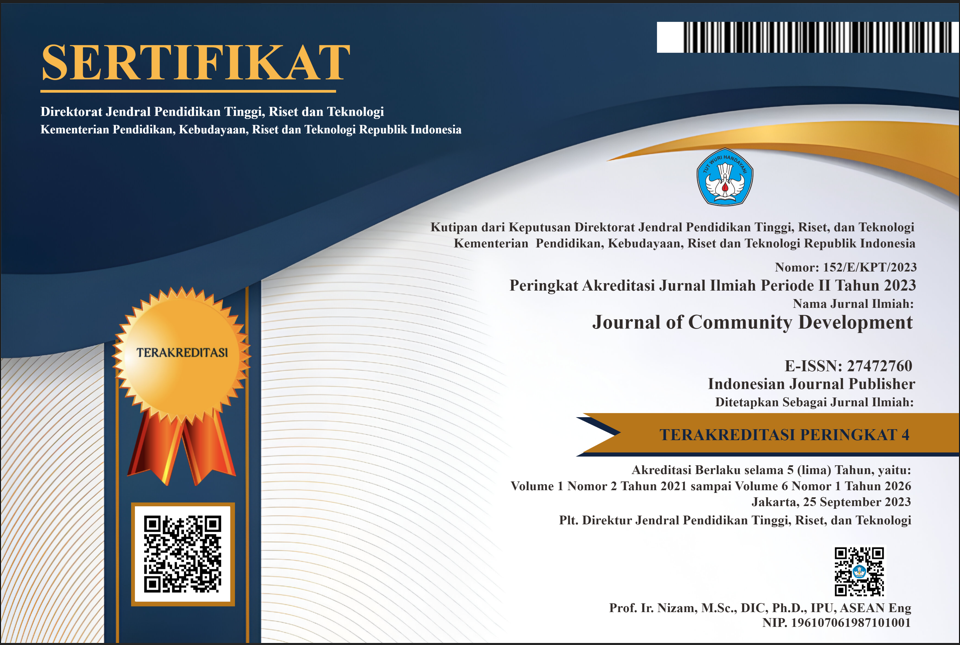Pelatihan Lilin Aromaterapi Berbasis Minyak Jelantah Untuk Pemberdayaan dan Ekonomi Sirkular
DOI:
https://doi.org/10.47134/comdev.v5i3.1381Keywords:
used cooking oil, aromatherapy candles, circular economy, youth empowerment, waste managementAbstract
The community in Pedukuhan Bakung, Yogyakarta, faces challenges in managing used cooking oil waste, which is often improperly disposed of, leading to environmental pollution. This community service program aimed to address this issue by empowering local youth through training on converting used cooking oil into valuable products. The training was attended by 10 youths from Pedukuhan Bakung, who gained an understanding of the environmental impacts of used cooking oil and practical skills in producing aromatherapy candles from purified used cooking oil. The program included socialization on the environmental impacts of used cooking oil, demonstrations of the purification process, and hands-on practice in making aromatherapy candles. Based on questionnaire evaluations, the program achieved an average success rate of 89.5%, with material clarity and direct benefits rated at 92.5%. Participants gave the highest rating of 95% for gaining new insights, reflecting the program's success in enhancing understanding of the circular economy. However, participants’ motivation to utilize used cooking oil as a valuable product still requires improvement, with a score of 85%. The training results demonstrated a significant increase in participants' environmental awareness and skills, as well as new economic opportunities through the utilization of used cooking oil. Several participants expressed interest in independently producing aromatherapy candles as an additional business opportunity. Follow-up training focusing on product diversification and marketing strategies is recommended to maximize the economic impact. This program successfully integrated environmental and economic aspects within the circular economy concept, providing the potential for sustainable benefits for the community.
Downloads
References
Aini, D. N. et al. (2020) “Pemanfaatan Minyak Jelantah Untuk Bahan Baku Produk Lilin Ramah Lingkungan Dan Menambah Penghasilan Rumah Tangga Di Kota Batu,” Warta Pengabdian, 14(4), hal. 253. doi: 10.19184/wrtp.v14i4.18539.
Bakhri, S., Mahdang, A. F. dan Kaseng, A. A. (2021) “Jurnal Teknologi Pangan dan Hasil Pertanian Pembuatan Hand Soap Dengan Proses Saponifikasi Dengan Pemurnian Minyak Jelantah Menggunakan Arang Aktif,” Jurnal Teknologi Pangan dan Hasil Pertanian, 16(2), hal. 1–9. doi: 10.26623/jtphp.v16i1.
Cahyono, L. et al. (2022) “Pelatihan Pembuatan Lilin Aromaterapi dari Minyak Jelantah Sebagai Sarana Peduli Lingkungan Perairan dan Implementasi Konsep Ekonomi Sirkular Warga Bumi Suko Indah,” Dharma Raflesia: Jurnal Ilmiah Pengembangan dan Penerapan IPTEKS, 20(1), hal. 53–67. doi: 10.33369/dr.v20i1.19271.
Emalia, Z. et al. (2023) “Penerapan Ekonomi Sirkular melalui Pembuatan Lilin Aroma Terapi Dari Minyak Bekas,” BEGAWI : Jurnal Pengabdian Kepada Masyarakat, 1(1), hal. 38–42. doi: 10.23960/begawi.v1i1.7.
Estikomah, S. A., Sawitri, S. B. dan Awaluddin, R. (2022) “Edukasi Serta Pelatihan Pengolahan Minyak Jelantah Menjadi Sabun Cuci di Kecamatan Mantingan Kabupaten Ngawi Jawa Timur,” Jurnal Abdi Insani, 9(4), hal. 1268–1275. doi: 10.29303/abdiinsani.v9i4.713.
Farouk, S. M. et al. (2024) “Sustainable production of biodiesel from waste cooking oil using magnesium oxide nano catalyst: An optimization study,” Scientific Reports, 14(1), hal. 1–11. doi: 10.1038/s41598-024-71930-1.
Foteinis, S. et al. (2020) “Used-cooking-oil biodiesel: Life cycle assessment and comparison with first- and third-generation biofuel,” Renewable Energy, 153, hal. 588–600. doi: 10.1016/j.renene.2020.02.022.
Hidalgo-Crespo, J. et al. (2022) “Towards a Circular Economy Development for Household Used Cooking Oil in Guayaquil: Quantification, Characterization, Modeling, and Geographical Mapping,” Sustainability (Switzerland), 14(15). doi: 10.3390/su14159565.
Kamarullah, S. et al. (2022) “Pembuatan Sabun Cuci Piring dari Minyak Jelantah untuk Mengurangi Limbah Rumah Tangnga di Desa Padang Luas Kampar,” Maspul Journal of Community Empowerment, 4(1), hal. 110–115.
Kenarni, N. R. (2023) “Pemanfaatan Minyak Jelantah dalam Pembuatan Lilin Aromaterapi,” Jurnal Bina Desa, 4(3), hal. 343–349. doi: 10.15294/jbd.v4i3.39225.
Kusmendar, K. et al. (2023) “Socialization of Composting Technology for Culinary Waste Management in Kampung Emas,” Journal of Community Development, 4(2), hal. 120–129. doi: 10.47134/comdev.v4i2.161.
Kusumaningtyas, R. D. et al. (2022) “Pengolahan Limbah Minyak Jelantah Menjadi Sabun Cuci Tangan sebagai Upaya Konservasi Lingkungan dan Pencegahan Penularan Virus Covid-19,” Jurnal Abdimas, 26(2), hal. 110–121. doi: 10.15294/abdimas.v26i2.40053.
Mulyaningsih, M. dan Hermawati, H. (2023) “Sosialisasi Dampak Limbah Minyak Jelantah Bahaya Bagi Kesehatan Dan Lingkungan,” Jurnal Penelitian dan Pengabdian Kepada Masyarakat UNSIQ, 10(1), hal. 61–65. doi: 10.32699/ppkm.v10i1.3666.
Okpo, S. O. dan Edafiadhe, E. D. (2024) “Unlocking the Power of Waste Cooking Oils for Sustainable Energy Production and Circular Economy: A Review,” ABUAD Journal of Engineering Research and Development (AJERD), 7(1), hal. 41–55. doi: 10.53982/ajerd.2024.0701.05-j.
Pramesti, L. (2022) “Penyuluhan Pemanfaatan Limbah Dapur ‘Khususnya Minyak Jelantah,’” Jurnal Locus Penelitian dan Pengabdian, 1(9), hal. 785–791. doi: 10.58344/locus.v1i9.933.
Ratnaningsih, W. et al. (2023) “Pemberdayaan Masyarakat Melalui Pembuatan Sabun Cair dari Minyak Jelantah di Bank Sampah Sidomulyo Maju,” Journal of Approriate Technology for Community Services, 5(1), hal. 33–42. doi: 10.20885/jattec.vol5.iss1.art5.
Sutomo, S. et al. (2023) “Pelatihan Penjernihan dan Pemanfaatan Minyak Jelantah Menjadi Lilin Aroma Terapi di Guntung Paikat , Banjarbaru Selatan , Kalimantan Selatan,” Jurnal Pengabdian ILUNG (Inovasi Lahan Basah Unggul), 2(3), hal. 452–457. doi: 10.20527/ilung.v2i3.
Thushari, I. dan Babel, S. (2022) “Comparative study of the environmental impacts of used cooking oil valorization options in Thailand,” Journal of Environmental Management, 310(February), hal. 114810. doi: 10.1016/j.jenvman.2022.114810.
Wardani, D. T. K., Saptutyningsih, E. dan Fitri, S. A. (2021) “Ekonomi Kreatif: Pemanfaatan Limbah Jelantah untuk Pembuatan Lilin Aromaterapi,” Prosiding Seminar Nasional Program Pengabdian Masyarakat, 3(2), hal. 402–417. doi: 10.18196/ppm.32.224.
Downloads
Published
How to Cite
Issue
Section
License
Copyright (c) 2024 Susanti, Tias Ernawati, Kusmendar, Tri Yulianto, Rahmawati Endah Witanti, Anisa Dwi Maslikhah

This work is licensed under a Creative Commons Attribution 4.0 International License.







